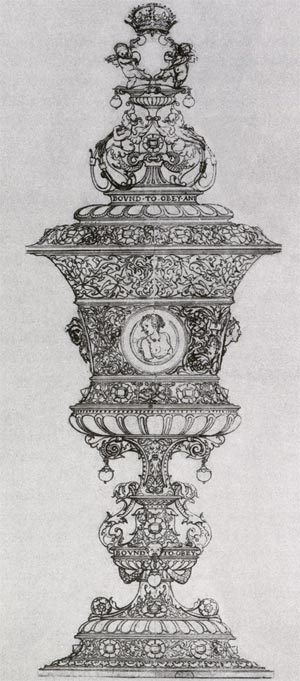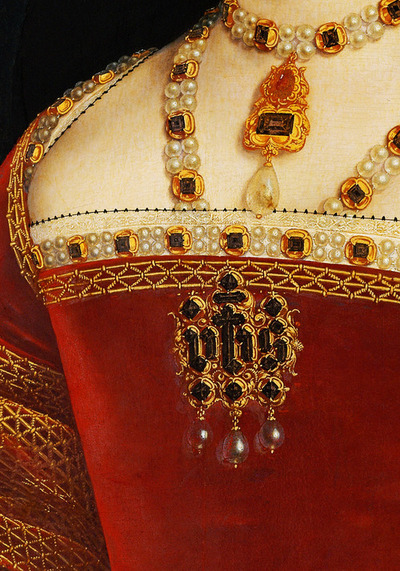 On May 30, 1536 - only eleven days after the execution of Anne Boleyn, Henry VIII married his third wife, Jane Seymour.
On May 30, 1536 - only eleven days after the execution of Anne Boleyn, Henry VIII married his third wife, Jane Seymour.The wedding was performed by Archbishop Cranmer at Whitehall Palace in the Queen’s Closet, a side chapel where the queen heard daily mass. Jane had been preparing for this event for weeks - even before Anne’s arrest. She had a new, elaborate wardrobe. Seamstresses must have been sewing day and night to get it completed in time.
 As a wedding gift, Henry gave his new bride a magnificent gold cup designed by Hans Holbein. It had her phoenix emblem and their entwined initials on its elaborately engraved surface, along with Jan’e chosen motto, Bound to Obey and Serve. To get it done in time, Holbein must have started working on it months before, long before Anne’s fall.
As a wedding gift, Henry gave his new bride a magnificent gold cup designed by Hans Holbein. It had her phoenix emblem and their entwined initials on its elaborately engraved surface, along with Jan’e chosen motto, Bound to Obey and Serve. To get it done in time, Holbein must have started working on it months before, long before Anne’s fall.The wedding was kept a secret for a few days yet to come. Even Henry recognized the people had been horrified at what he’d done to his last wife. A few days prior, he had ordered his council to “beg” him to remarry “for the good of the realm,” to which he had graciously consented. But that didn’t stop the ballad writers, who composed works lamenting the sad fate of Anne Boleyn. And so, realizing his actions were seen as distasteful, Henry married Jane quietly and decided not to announce it for a bit until outrage cooled.
Despite her humble motto and demure demeanor, the new queen had an agenda. Her supporters had given her their assistance because Jane promised to advance their goal: to get Princess Mary restored as Henry’s heir. Jane realized that part of the reason Henry had come to despise Anne was her strong and bold avocation of her causes. Jane intended to try a more outwardly submissive approach. Her first effort was a failure. Henry retorted that instead of worrying about Mary, Jane ought to be seeking the advancement of the children she would have with Henry.
She didn’t intend to give up, but she had to be subtle about it. In the meantime, all traces of the previous queen were being erased. Anne’s emblems, initials, and badges were being ripped off the palace walls. Anne’s falcon was re-carved to become Jane’s phoenix, and her secondary emblem of the leopard was being refitted with new tails and heads to become Jane’s panther.
 Only three years prior on this same date, Anne’s coronation procession had begun. And now England’s new queen was waiting impatiently in the wings for her status to be announced.
Only three years prior on this same date, Anne’s coronation procession had begun. And now England’s new queen was waiting impatiently in the wings for her status to be announced.Did Jane feel any trepidation when she considered what had happened to her predecessor? Or did she assure herself she knew how to handle Henry and that her supporters would keep her protected? Did she console herself that if Anne hadn’t been technically guilty, she still “deserved” to die because of what had happened to Queen Katharine and the heresy of the new church?
In any case, the die was cast. In the end, Jane had no more choice than Anne Boleyn had when Henry said he wanted to marry her. A king’s proposal was not something that could be declined. For better or worse, Jane Seymour was the new queen of England.
No comments:
Post a Comment